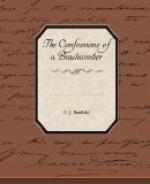a cheerful chirrup. At certain seasons scores
congregate on a branch, perching in a row, so closely
compact that their breasts show as a continuous band
of white. When one leaves his place to catch an
insect, the others close up the ranks and dress the
line, and on returning, wrangle and scold as he may,
he needs must take an outside place. Let a bush
fire be started, and flocks of wood-swallows whirl
and circle along the flanks of the circling smoke,
taking flying insects on the wing, or deftly pick
“thin, high-elbowed creatures,” scuttling
up tree-trunks out of the way of the flames.
Those were the marauders who confounded anticipations
of a comfortable livelihood in the decent calling of
an apiarist. They devoured bees by the hundred
every day. Every hive paid dreadful toll to them,
for they found food so plentiful, and with so little
exertion, that they made the vicinity of the hives
a permanent abiding place. For a brief season
I found myself confronted by a problem. I had
to apply my own favourite theories and arguments to
myself and weigh against them practical advantages.
Honey was plentiful and, given that the bees were
protected against voracious enemies, might have been
stored in marketable quantities. But was I not
bound by honour as well as sentiment to protect the
birds? Was not my coming hither due to a certain
extent to a wish for the preservation of bird-life?
Was there not in my presence an implied warranty to
that effect? Had not the island since my occupancy
become a sanctuary, a city of refuge, a safe abiding
place, a kingdom where all the birds of the air—save
tyrants and cannibals were welcomed with gladness
and enthusiasm? Had I not warned others of the
dreadful consequences that would befall any disturbance
of the sacred air by so much as the unauthorised report
of a gun? How then was I to deal out justice
to the defenceless bees that I had hurried hither,
willy-nilly, without consideration of their likes and
dislikes and their multitudinous descendants?
How protect my investment in apiarist plant?
How maintain the stock of honey, white, golden and
tawny brown, excellent, wholesome delicious food,
and still preserve the natural rights, the privileges
of the birds? Had not the birds the right of prior
occupancy and other legitimate claims, in addition
to sentimental demands upon my conscience? Not
only, too were the birds beautiful to look upon and
of engaging habits; not only had they become companionable
and trustful; not only were they among the primeval
features of the island that I was so eager to leave
unspotted from the world; but they were eminently
useful in the work of keeping within bounds the rampant
host of insects to which mankind is in the habit of
applying the term injurious.




